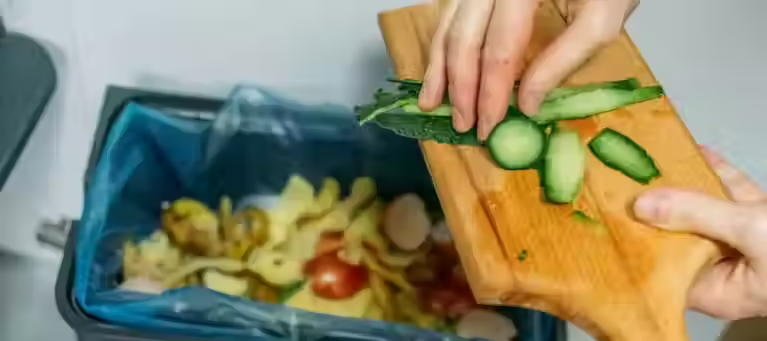Food Waste Separation for Businesses: Cutting Costs and Carbon
- Benji Waste
- Jul 21, 2025
- 3 min read

Food waste is one of the most expensive and environmentally damaging waste streams for commercial businesses in the UK. Whether you're running a restaurant, food court, supermarket, hotel kitchen, or retail outlet with food preparation, separating food waste at source is critical to reducing disposal costs, minimising carbon emissions, and improving site hygiene.
With the UK government’s upcoming mandatory food waste separation legislation for businesses, now is the time to implement systems that work—for your teams, your customers, and your bottom line.
Why Your Business Should Separate Food Waste
1. Lower Waste Bills
General waste collections are priced by weight and frequency. Because food is heavy and often mixed into general waste, separating it into dedicated food waste bins can lead to substantial savings. Organics collections are typically cheaper per tonne than landfill or incineration routes.
2. Legal Compliance (UK Waste Reform)
Under planned UK Simpler Recycling reforms, businesses producing food waste will be legally required to separate it for collection. Sites without food waste bins will face potential penalties.
3. Improved Hygiene and Pest Control
When food is mixed with other waste streams, it causes odour, leakage, and pest risks. Frequent removal of separated food waste improves site hygiene, particularly in kitchens and hospitality settings.
4. Better ESG Reporting and Public Image
Food waste separation supports your ESG and sustainability goals by improving your landfill diversion rate and reducing methane emissions. Customers and investors increasingly expect to see responsible waste practices in food-focused businesses.
Key Steps to Set Up Food Waste Separation in Commercial Environments
Benji Waste works with commercial clients across retail, hospitality, and multi-site portfolios to create efficient, compliant food waste systems. Here’s how to get started:
1. Source Separation in Kitchens and Food Areas
Install food-only bins in high-waste areas:
Food prep counters
Dishwashing stations
Buffets and service counters
Staff canteens
Avoid mixing in packaging, liquids, or compostable plastics unless your haulier can process them.
2. Staff Training and Engagement
Train all kitchen, FOH, and cleaning staff on what food waste includes:
Acceptable:
Vegetable trimmings
Bread and bakery waste
Dairy, meat, fish (cooked or raw)
Plate leftovers
Coffee grounds, tea bags
Not accepted:
Plastic wrap
Cardboard packaging
Glass
Oils (requires separate stream)
Include food waste handling in induction training and display clear, icon-based signage near bins.
3. Use of Kitchen Caddies and Transfer Containers
Set up a two-tier bin system:
Small countertop caddies for prep areas
Larger food waste bins with colour-coded liners for back-of-house or external transfer
Use green liners or compostable bags if accepted by your processor.
4. External Collection and Compliance Reporting
Partner with a licensed organics haulier who can provide:
Weekly or daily food waste pickups
Reporting by volume per site
Processing via composting or anaerobic digestion (AD)
Ask your waste provider for diversion rates and carbon savings data to feed into ESG reports.
5. Cold Waste Storage (Where Needed)
In high-volume kitchens or hot weather conditions, install cold storage units or keep bins in fridges to reduce odour and delay decomposition between collections.
Advanced Tactics for Food Waste Reduction
For sites looking to go beyond separation and reduce food waste at the source:
Install Digital Food Waste Tracking Tools
Platforms like Winnow and Leanpath allow commercial kitchens to track what’s being wasted (and why). Many sites report up to 50% reduction in waste within months of use.
Run Team Incentives or Competitions
Set up friendly challenges between kitchen teams or branches to reduce food waste, with performance dashboards and recognition for progress.
Redistribute Edible Surplus
Partner with food waste charities like FareShare, Too Good To Go, or local redistribution networks to donate surplus food. Create a simple, documented process for food safety and handling.
Pro Tip
Contamination is one of the biggest causes of rejected food waste loads. Ensure all packaging is removed—particularly cling film, polystyrene trays, and plastic containers—before disposing of food.
How Benji Waste Supports Commercial Food Waste Separation
At Benji Waste, we help businesses across hospitality, retail, and facilities management to:
Set up dedicated food waste bins and liners
Develop clear, site-specific signage and staff guides
Provide access to licensed food waste collectors and processors
Monitor waste volumes and contamination
Align waste practices with upcoming UK legislation
Start Separating Food Waste the Smart Way
Whether you manage a hotel group, restaurant, supermarket, or food court, Benji Waste can help design a food waste system that works for your site, your staff, and your sustainability targets.
Get started with Benji Waste today
.png)
.png)


